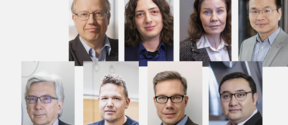Saija Toivonen appointed as Assistant Professor of Real Estate Economics

D.Sc. (Econ) Saija Toivonen, (born 1980), has been appointed to the position of Assistant Professor in the Aalto University Department of Built Environment for the period 1.8.2019–31.7.2022. The field of her professorship is real estate economics.
Toivonen has been working as a university lecturer in real estate economics at Aalto University since 2015, and prior to this she worked as a postdoctoral researcher from 2011 to 2015. She has also previously worked as a concept developer for NCC, where her work focused on market analyses for housing construction. Toivonen has teaching experience since 2007.
Saija Toivonen defended her doctoral thesis in the field of real estate economics at Aalto University in 2011, with her thesis title being ‘The future commercial real estate market – the forces of change, influences and preferences in the Helsinki metropolitan area’.
What does futures research have to offer to real estate economics?
Properties are by nature inflexible, long lasting, and located in a particular place. They affect the surrounding society in many ways, both directly and indirectly. A significant amount of private and public wealth is locked into property. They also have large environmental footprints and, at the same time, major social impacts as well.
When it comes to building a future that is socially, economically and environmentally sustainable, it is essential to aim at anticipating the future real estate operating environment. Futures research offers a wide range of methods for future-oriented research into real estate economics.
What phenomena are currently affecting the construction and real estate sector?
In the real estate sector, the same forces of change are at work as in the surrounding operating environment and society. There are different kinds of change forces. Some are widely recognised megatrends such as globalisation or urbanisation. Some change forces, on the other hand, are only detected by a few, such as weak signals, which are the first signals of a potentially significant phenomenon. Weak signals can give a head start with those who identify them.
On the other hand, some forces of change operate without us being aware of it. For example, ways of thinking in certain fields – referred to as ‘driving force’ phenomena – are not necessarily either known or questioned, yet they guide our decisions and choices. Continuous striving for greater efficiency could be one such phenomenon in the real estate markets.
For a large number of change forces, one can also observe a counterforce in action. Alongside globalisation, for example, we have seen the growth in the significance of locality and stories.
The change forces impacting the operating environment are shaping the future, and this makes them very interesting to investigate. I believe that in the future we will see more and more mixing of traditional real estate types (housing, work and consumption), increasing use of innovations such as 3D printing and monitoring, and phenomena related to the mobility of buildings, such as location independence.
What would you like to achieve in the next five years?
Over the next five years, I would like to gather around me a multidisciplinary group of researchers. The group's name would be futuRE, combining the words ‘future’ and ‘real estate’. We would be united by our curiosity, open-mindedness, enthusiasm and sense of humour. FutuRE would conduct research that would have social significance and also make a significant scientific contribution. I can see that there are many major challenges ahead for the real estate markets. In particular, I would like to be involved in solving them and harnessing futures research to support research into the real estate markets.
What do you enjoy in your role as a teacher?
By far the best thing about teaching is the interaction with students. The presence of young students and researchers from different backgrounds makes the entire working environment a dynamic and ever interesting place to work. As I see forecasting the future of real estate as an essential skill, I also include futures thinking and our research results in my teaching. My goal is to create an open and interactive atmosphere where everyone can participate and discuss. I believe that this is the way that students can best internalise the multidimensional nature of real estate markets and their connections with many different phenomena of both a rational and irrational nature.
Further information:
Saija Toivonen
Assistant Professor
Aalto University
saija.toivonen@aalto.fi
tel. +358 (0)50 534 5773
Read more news
Growing Materials, Growing Ideas: Inside the BioMaker Studio
At Aalto University’s BioMaker Studio, initiated by Ena Naito, students and researchers experiment with living materials, from algae to mycelium, creating an open, interdisciplinary space where design, biology, and collaboration grow together.
Research Council of Finland establishes a Center of Excellence in Quantum Materials
The Centre, called QMAT, creates new materials to power the quantum technology of coming decades.
Major funding powers development of next-generation machine technology aimed at productivity leap in export sectors
The BEST research project is developing new types of sealing, bearing, and damping technology.






